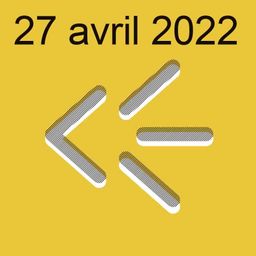Language Instruction Outside the Classroom and in Study Abroad
Mon statut pour la session
Language Instruction Outside the Classroom and in Study Abroad
Brett Fischer et Danielle Viens
Cégep André-Laurendeau et Cégep du Vieux Montréal
Des questions en anglais et en français sont les bienvenues.
At MeLT 2019, we presented findings from a one-year project on facilitating interactions between students and highly competent speakers (HCSs). We interviewed 22 language teachers from six different CEGEPs who engaged their students in learning activities that involved interaction with HCSs. Our findings indicated that teachers develop and maintain opportunities for authentic interaction for numerous reasons, including increasing students’ motivation and engagement, as well as the teachers’ own personal and professional fulfillment and growth (Fischer et al., 2021).
Since 2019, we have focused on facilitating interactions between students and HCSs in the specific context of short-term language study abroad (SA). Short-term language SA accounts for more than 50% of SA (Institute of International Education [IIE], 2020), is an understudied area (Benson, 2011; Hyland, 2004; Inozu et al., 2010; Pearson, 2003) and presents contradictory findings regarding language gains (Hirai, 2018; Mason et al., 2015; Tseng et al., 2021; Varela, 2017; Yang, 2016). Since the quality of instruction is one of the most powerful variables on classroom outcomes (Hattie, 2009), we wondered if it could not also account for the variability of outcomes in short-term language SA. To learn more about effective SA language teaching practices, we designed a three-year qualitative project that included 48 interviews with students and teachers from seven different CEGEPs. A complementary analysis using constructivist grounded theory (Charmaz, 2006) and narrative analysis (Riessman, 2008) revealed four broad categories: 1) pedagogical decisions are often made on the basis of teachers’ cognitive load and available resources in the planning and facilitation phases of SA; 2) teachers aim for both measurable outcomes and process-based experiential objectives; 3) teachers use a repertoire of strategies to meet objectives; 4) from students’ perspectives, teacher-facilitated short-term language SA provides structure, pedagogy, attention to affect, and two-way communication.
This follow-up presentation will shed further light on a common yet understudied language teaching practice and assist educators in facilitating student interactions with HCSs outside the classroom.
References
Benson, P. (2011). Language learning and teaching beyond the classroom: An introduction to the field. In P. Benson & H. Reinders (Eds.), Beyond the language classroom (pp. 7–16). Palgrave MacMillan.
Charmaz, K. (2006). Constructing grounded theory: A practical guide through qualitative analysis. Sage Publications; /z-wcorg/.
Fischer, B., Viens, D., Rondeau, D., Turgeon-Gouin, C., & Plaxton, E. (2021). Facilitating Interactions between Additional-Language Students and Highly Competent Speakers. The Canadian Modern Language Review, 77(3), 189-211.
Hattie, J. (2009). Visible learning: A synthesis of over 800 meta-analyses relating to achievement. Routledge.
Hirai, A. (2018). The effects of study abroad duration and predeparture proficiency on the L2 proficiency of Japanese university students: A meta-analysis approach. JLTA Journal, 21, 102–123. https://doi.org/10.20622/jltajournal.21.0_102
Hyland, F. (2004). Learning autonomously: Contextualizing out-of-class English language learning. Language Awareness, 13, 180–198.
Inozu, J., Sahinkarakas, S., & Yumru, H. (2010). The nature of language learning experiences beyond the classroom and its learning outcomes. US-China Foreign Language, 8(1), 14–21.
Institute of International Education [IIE]. (2020). 2019 Open Doors Report: U.S. study abroad. https://www.iie.org/Research-and-Insights/Open-Doors/Data/US-Study-Abroad/Duration-of-Study-Abroad
Mason, L., Powers, C., & Donnelly, S. (2015). The Boren awards: A report of oral language proficiency gains during academic study abroad. Institute of International Education. https://www.iie.org/Research-and-Insights/Publications/The-Boren-Awards-A-Report-Of-Oral-Language-Proficiency-Gains
Pearson, N. (2003). The idiosyncrasies of out-of-class language learning: A study of mainland Chinese students studying English at tertiary level in New Zealand. The Independent Learning Conference, Melbourne, Australia.
Riessman, C. K. (2008). Narrative methods for the human sciences. Sage Publications; /z-wcorg/.
Tseng, W.-T., Liu, Y.-T., Hsu, Y.-T., & Chu, H.-C. (2021). Revisiting the effectiveness of study abroad language programs: A multi-level meta-analysis. Language Teaching Research, 1–45. https://doi.org/10.1177/1362168820988423
Varela, O. E. (2017). Learning outcomes of study-abroad programs: A meta-analysis. Academy of Management Learning & Education, 16(4), 531–561. https://doi.org/10.5465/amle.2015.0250
Yang, J. (2016). The effectiveness of study abroad on second language learning: A meta-analysis. The Canadian Modern Language Review, 72(1), 66–94.


Discussion